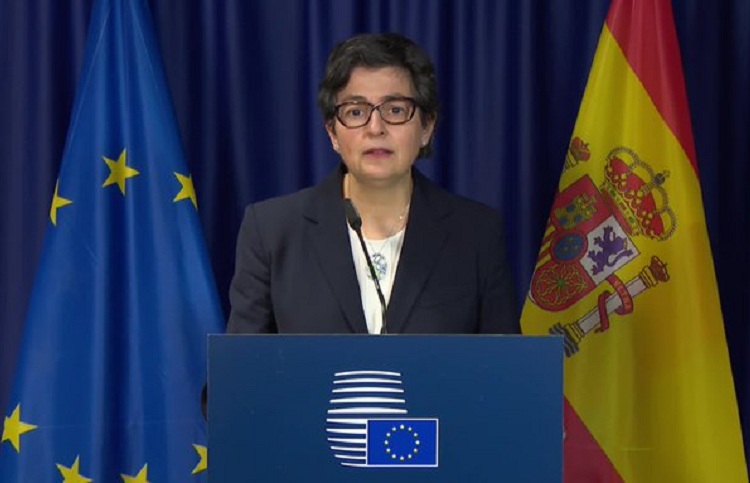Eduardo González
The Minister of Foreign Affairs, Arancha González Laya, yesterday expressed the Spanish Government’s “full support” for the European Commission’s dealings with pharmaceutical companies following the official protest from Brussels over the delays in the AstraZeneca vaccine, stating that “what Spain is asking is that the companies comply with the contracts they have signed with the EU institutions”.
“We have to trust the European Commission and its management of vaccines” because “when negotiating on behalf of more than 600 million consumers, the negotiating power is a little greater than if you are negotiating solely and exclusively for one country”, the minister declared at the press conference following the EU Foreign Affairs Council, held yesterday in Brussels. European Commission President Ursula Von der Leyen yesterday phoned AstraZeneca CEO Paschar Soriot to express Brussels’ outrage at the announced delays in the distribution of 300 million doses, despite the fact that the company’s vaccine has not yet been officially approved by the European Medicines Agency. While the Commission has not yet announced possible legal action, one Member State, Italy, will take the company to court.
“We have full confidence in the ability of the EU institutions not only to negotiate contracts with pharmaceutical companies, but also to ensure compliance”, the Minister continued. “We will support the European Commission in whatever it considers useful to ensure compliance with the contracts with Pzifer, which has briefly interrupted its supplies to Europe to increase its production; with Moderna, which has to significantly scale up its production to cope with EU purchases; and with Astra Zeneca, although let us not forget that first we have to get marketing authorisation for Astra Zeneca in Europe”, she added.
The “most useful” thing to do at the moment, she warned, is to “let the European Commission, calmly and calmly, conduct these negotiations, in which, in any case, it will have Spain’s full support”. Likewise, and with regard to the Spanish government’s actions, “what Spain is asking of the pharmaceutical companies is very simple: that they comply with the contracts they have signed with the EU institutions” and that “they comply with the delivery schedule to which they have committed themselves”, so that the EU Member States can “proceed with the vaccination schedule that will allow us to move towards herd immunity in the summer”.
Dark red areas: “Spain and practically the whole of the EU”
The European Commission yesterday recommended that Member States tighten restrictions on movement in areas above the threshold of 500 per 100,000 infections (marked in dark red on the map approved last week by the European Council) and avoid travel to or from high-risk areas.
“Last week, it was decided to colour the map of Europe more intensely in areas with a higher incidence of COVID”, the Foreign Minister recalled at yesterday’s press conference. “This is the case in Spain, but it is also the case in practically all EU Member States; you only have to look at the map”, she added.
The aim of creating this map, she said, is to avoid a return to border closures similar to the first wave of COVID-19 and to “empower the regions that have the highest incidence to take additional measures to limit mobility”. “The Commission has not told each region what to do, nor has it prescribed exactly what measures should be taken by each region that is in this intense red, what it has told them is that the important thing in those regions is to limit mobility, especially when it is not essential”, she added.
In this sense, she recalled, “in Spain very specific measures have already been taken and are being taken so that the areas most affected by COVID adopt perimeter confinements which, to begin with, already limit mobility between regions, autonomous communities or cities”. “In a way, Spanish co-governance had already anticipated, through these perimeter closures, what later became an EU recommendation”, she concluded.






